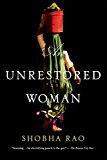Summary | Excerpt | Reading Guide | Reviews | Beyond the Book | Readalikes | Genres & Themes | Author Bio

AN UNRESTORED WOMAN
Neela, on the night she learned of her husband's death, sat under the banyan tree outside their hut and felt an intense hunger. It was on the night of the train accident. No, not an accident, she corrected herself. Not at all. She felt this same hunger on her wedding day. She was thirteen years old and she sat on the altar wearing a sparkling red sari and the gold mangal sutra around her neck—thin, even by the reduced standards of the impoverished northern village—and tried desperately to silence her growling stomach.
The hunger on her wedding day might've been caused by the tempting mountains of food stacked around her. Fruits, coconuts, laddoos, twisted piles of orange jilebi. She'd never seen so much food; her mouth watered. She hadn't eaten since early morning and that had only been a meager helping of rice and buttermilk. Neela eyed the bananas and mangoes piled on the plate between her and the priest. He was reciting Sanskrit prayers. Her new husband, who sat beside her, wiry and dark like a dry summer chili, was turned away from her, talking to a man she didn't recognize. In truth she hardly even recognized her groom. Her red veil obscured him from view. Besides, she'd only seen him once before; she'd stolen a glimpse when he'd sat talking with her father, both of them bent and pecking over the details of her marriage like two crows over a piece of stale bread.
Her father had said it was a good match; he'd given her future husband—who was twenty-four years old and owned a tea shop catering to the commuter trains between Amritsar and Lahore—two cows, a trunk full of pots and pans, a bag of seed, and a green woolen blanket. Even the thickness of the gold necklace had been negotiated. Babu, her groom, had scowled at its flimsiness and had only been appeased when Neela's father had said, "Look. Look at that girl. Strong as an ox. She'll bear you no less than ten sons!"
Neela stared at the plate. She obviously couldn't eat one of the mangoes but why not a banana? If only she could sneak it from the plate then she could manage peeling it under her veil. Her bent head would hide the chewing. She extended an arm forward surreptitiously. Then a little farther. She sighed. It was just beyond her reach. Someone would notice. She pulled back, weak, hungrier than ever. The plump yellow of the bananas called to her. Their smooth skins were the edge of a sunrise. They were the voice of her mother. She'd died giving birth to Neela but Neela had imagined her voice many, many times, flawless and brave and cool like the banana skin. Just then the priest shifted his legs and jostled the plate. What luck! It bumped closer to Neela. This was her chance. Her arm darted out, plucked the outermost banana, and whisked it under her veil. The first bite slid down her throat and into her empty stomach. Her eyes widened with delight just as her husband's had when he'd opened the trunk full of glistening pots.
* * *
The details of the train wreck trickled down to Neela. First over the news wire, heard by the men of the village over the transistor radio in the home of Lalla, the village elder. Neela had once seen this famous radio—the only one among all of the neighboring villages. The smooth wooden box with the mysterious voices spilling out of it was placed on a high shelf and protected from dust and insects by a velvet cloth; even Lalla's wife was forbidden to touch it. He brought the news to her mother-in-law, whom Lalla came to see as soon as the news program ended, just before dinner. Neela was hungry; she was about to set out three plates when he told her the news. "Those ugly Muslims," he said. "They would torch a train full of children as long as they were Hindu." Her mother-in-law, nearly blind, kind and gentle compared to most mother-in-laws Neela had heard stories about, had only looked up at Lalla with her sad, unadorned eyes and said, "Every mother will tell you: that trainwas full of children."
Excerpted from An Unrestored Woman by Shobha Rao. Copyright © 2016 by Shobha Rao. Excerpted by permission of Flatiron Books. All rights reserved. No part of this excerpt may be reproduced or reprinted without permission in writing from the publisher.
Use what talents you possess: The woods would be very silent if no birds sang there except those that sang best
Click Here to find out who said this, as well as discovering other famous literary quotes!
Your guide toexceptional books
BookBrowse seeks out and recommends the best in contemporary fiction and nonfiction—books that not only engage and entertain but also deepen our understanding of ourselves and the world around us.